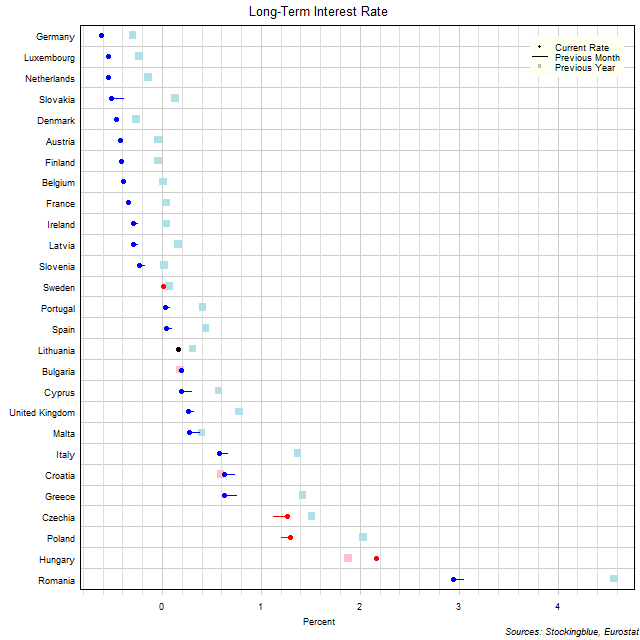
The chart above shows the ten-year interest rate in each EU state as of December 2020, the change from the previous month, and the rate one year prior. Twelve states have a negative interest rate (same as 12 last month and up from six last year).
Findings
- The difference (spread) between the state with the lowest long-term interest rate, Germany, and the state with the highest, Romania, is 3.56 percentage points (down from 3.65 last month and down from 4.87 last year). Germany had the lowest rate last year and last month. Romania had the highest rate last year and last month.
- The median long-term interest rate in the 28 EU states is 0.03 (down from 0.07 the previous month and down from 0.18 last year) and the mean 0.21 (down from 0.24 the previous month and down from 0.59 last year).
- Of the 27 states, one saw no change in the long-term interest rate from the previous month, 22 saw the rate decrease, and four saw the rate increase.
- Of the 27 states, zero saw no change in the long-term interest rate from last year, 24 saw the rate decrease, and three saw the rate increase.
Caveats
- Data is from December 2020, November 2020, and December 2019.
- Estonia does not currently issue any sovereign debt that complies with the definition of long-term interest rates for convergence purposes and no suitable proxy indicator has been identified, therefore there is no data available for Estonia.
- All figures are rounded to the nearest hundredth.
Details
Slovakia saw its rate drop the most over the previous month dropping 0.13 percentage points. On the flip side, Czechia saw its rate rise the most gaining 0.14 percentage points. Year over year, Romania saw its rate drop the most with a 1.63 percentage point drop while Hungary saw its rate rise the most gaining 0.28 percentage points.
Slovakia (from 7th lowest rate to 4th lowest rate) rose three spots over the course of the month. Conversely, Denmark (from 4th to 5th), Austria (from 5th to 6th), and Finland (from 6th to 7th) fell one spot.
Over the course of the year, Slovakia (from 12th to 4th) rose eight spots. On the flip side, Slovenia (from 8th to 12th) and Malta (from 16th to 20th) fell four spots.
For reference, the United States' ten-year note was 1.86% in December 2019, 0.87% in November 2020, and 0.93% in December 2020, meaning that Czechia, Poland, Hungary, and Romania have higher rates than the US. Japan's ten-year rate was -0.01% in December 2019, 0.03% in November 2020, and 0.02% in December 2020 being bested by Germany, Luxembourg, the Netherlands, Slovakia, Denmark, Austria, Finland, Belgium, France, Ireland, Latvia, Slovenia, and Sweden.
Data
| State | December 2019 | November 2020 | December 2020 |
|---|---|---|---|
| Austria | -0.04 | -0.41 | -0.42 |
| Belgium | 0.01 | -0.38 | -0.39 |
| Bulgaria | 0.18 | 0.2 | 0.19 |
| Croatia | 0.59 | 0.73 | 0.63 |
| Cyprus | 0.57 | 0.29 | 0.19 |
| Czechia | 1.51 | 1.12 | 1.26 |
| Denmark | -0.26 | -0.46 | -0.47 |
| Finland | -0.04 | -0.4 | -0.41 |
| France | 0.04 | -0.33 | -0.34 |
| Germany | -0.3 | -0.61 | -0.62 |
| Greece | 1.42 | 0.75 | 0.63 |
| Hungary | 1.88 | 2.15 | 2.16 |
| Ireland | 0.04 | -0.25 | -0.29 |
| Italy | 1.37 | 0.66 | 0.58 |
| Latvia | 0.16 | -0.25 | -0.29 |
| Lithuania | 0.31 | 0.16 | 0.16 |
| Luxembourg | -0.23 | -0.54 | -0.55 |
| Malta | 0.4 | 0.37 | 0.27 |
| Netherlands | -0.14 | -0.54 | -0.55 |
| Poland | 2.03 | 1.2 | 1.29 |
| Portugal | 0.41 | 0.07 | 0.03 |
| Romania | 4.57 | 3.04 | 2.94 |
| Slovakia | 0.13 | -0.39 | -0.52 |
| Slovenia | 0.02 | -0.18 | -0.23 |
| Spain | 0.44 | 0.09 | 0.04 |
| Sweden | 0.07 | 0 | 0.01 |
| United Kingdom | 0.78 | 0.31 | 0.26 |
Sources
Eurostat. 2021. "EMU Convergence Criterion Series - Monthly Data." Accessed February 3, 2021. https://appsso.eurostat.ec.europa.eu/nui/show.do?query=BOOKMARK_DS-055774_QID_322B2875_UID_-3F171EB0&layout=TIME,C,X,0;GEO,L,Y,0;INT_RT,L,Z,0;INDICATORS,C,Z,1;&zSelection=DS-055774INDICATORS,OBS_FLAG;DS-055774INT_RT,MCBY;&rankName1=INDICATORS_1_2_-1_2&rankName2=INT-RT_1_2_-1_2&rankName3=TIME_1_0_0_0&rankName4=GEO_1_2_0_1&sortC=ASC_-1_FIRST&rStp=&cStp=&rDCh=&cDCh=&rDM=true&cDM=true&footnes=false&empty=false&wai=false&time_mode=NONE&time_most_recent=false&lang=EN&cfo=%23%23%23%2C%23%23%23.%23%23%23.
Eurostat. 2021. "Government Bond Yields, Ten Years' Maturity - Monthly Data." Accessed February 3, 2021. https://appsso.eurostat.ec.europa.eu/nui/show.do?query=BOOKMARK_DS-054880_QID_34457F52_UID_-3F171EB0&layout=TIME,C,X,0;GEO,L,Y,0;MATURITY,L,Z,0;INDICATORS,C,Z,1;&zSelection=DS-054880INDICATORS,OBS_FLAG;DS-054880MATURITY,Y10;&rankName1=MATURITY_1_2_-1_2&rankName2=INDICATORS_1_2_-1_2&rankName3=TIME_1_0_0_0&rankName4=GEO_1_2_0_1&sortC=ASC_-1_FIRST&rStp=&cStp=&rDCh=&cDCh=&rDM=true&cDM=true&footnes=false&empty=false&wai=false&time_mode=NONE&time_most_recent=false&lang=EN&cfo=%23%23%23%2C%23%23%23.%23%23%23.